Our Phoenix Bankruptcy Attorneys Discuss the Many Businesses Facing Bankruptcy Due to Covid-19
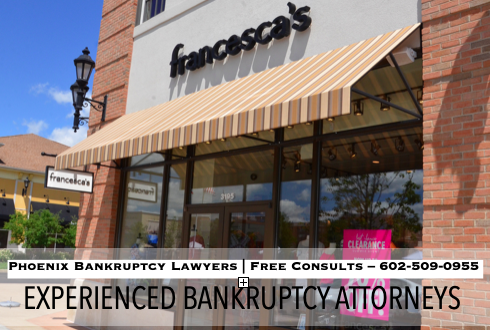 The coronavirus pandemic continues to wreak havoc on the global economy as we draw closer to the end of the year. While unemployment rates have since stabilized, unemployment had reached levels comparable to those during the Great Depression. With millions of Americans experiencing a decrease in income in 2020, among the lowest of people’s priorities are fashion, accessories, and jewelry. Major clothing retailers declaring bankruptcy has become almost a daily occurrence. The latest to join these ranks is Francesca’s, a boutique-style fashion chain that can be found at many shopping malls.
The coronavirus pandemic continues to wreak havoc on the global economy as we draw closer to the end of the year. While unemployment rates have since stabilized, unemployment had reached levels comparable to those during the Great Depression. With millions of Americans experiencing a decrease in income in 2020, among the lowest of people’s priorities are fashion, accessories, and jewelry. Major clothing retailers declaring bankruptcy has become almost a daily occurrence. The latest to join these ranks is Francesca’s, a boutique-style fashion chain that can be found at many shopping malls.
More Information About Francesca’s
Francesca’s was founded in 1999 in Houston, Texas, where it is still headquartered. The brand has approximately 700 stores in the United States, about half of which are located in shopping malls. Like many other retailers, Francesca’s was forced to close in March 2020, and some of these closures have become permanent. Francesca’s originally announced that it would be permanently shutting down 140 of its locations. After declaring Chapter 11 bankruptcy on December 3, 2020, it has amended the store closures amount to include 97 additional locations, bringing the total to 237 store closures. The closures are expected to be completed by the end of January 2021.
Out of the 237 Francesca’s locations that are closing, two of them are located in Arizona. The chain’s Flagstaff and Glendale locations are among those to be closed by the first month of 2021. Arizona shoppers looking for holiday gifts may want to consider visiting these stores and Francesca’s website for liquidation sales.
A Brief Overview of Chapter 11 Bankruptcy
Chapter 11 bankruptcy is far more complicated than Chapter 7 and Chapter 13, the two most common types of bankruptcy that your friends or family members may have filed. In turn, attorney’s fees, filing fees, and other bankruptcy-related expenses are much higher in a Chapter 11, so this type of bankruptcy is typically only used by organizations and individuals with millions of dollars in assets and liabilities. However, there are Chapter 11 small business provisions for companies that aren’t as affluent.
Usually, a company will have a fairly good idea of what their strategy is to restructure debts and emerge from the bankruptcy. The company must submit a proposal of how to do so, and submit it to a panel of their top creditors. The creditors will then vote on the proposal. If the panel approves the proposal, the bankruptcy will proceed according to plan as long as it is also approved by the court. If the panel doesn’t vote to approve the company’s proposal, they may submit their own.
Other Types of Bankruptcies Available to People in Phoenix
As mentioned above, the two most common types of bankruptcy are Chapter 7 and Chapter 13. Chapter 7 is available to certain types of businesses, and both are available to individual filers. A trustee is assigned to oversee each type of case, and filers of both chapters are required to complete credit counseling courses and attend a hearing known as a 341 Meeting of Creditors.
Chapter 7 is known as a liquidation bankruptcy because it discharges most debts without any repayment. For that reason, there are strict income eligibility limits for Chapter 7. There are also limits on how much equity filers can have in their assets, which are known as “exemptions.” A Chapter 7 bankruptcy typically takes about 4-6 months from the date of filing to be discharged.
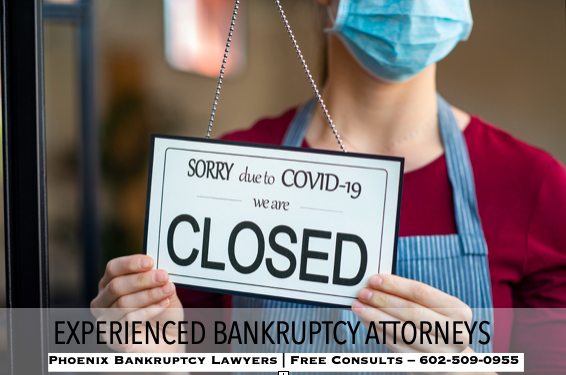
Francesca’s Bankruptcy Plan
Like many struggling businesses with a heavy focus on brick and mortar sales, one of Francesca’s top creditors is Simon Property Group. One of Francesca’s other lenders, Tiger Finance, has provided $25 million in financing to help the company with fees associated with breaking leases for the locations that are closing. Francesca’s plans on finding an investor to sell to as part of the bankruptcy process. Some companies convert creditors’ balances into ownership shares, but Francesca’s debt to asset ratio was too high to make this plausible.
Other Companies to Declare Bankruptcy During the Pandemic
Francesca’s is far from the first major business to declare bankruptcy as a result of the coronavirus pandemic. Fashion has been one of the hardest hit industries, with Neiman Marcus, JCPenney, J. Crew, Men’s Wearhouse, Brooks Brothers, Ann Taylor, Lane Bryant, True Religion, Lucky Brand, and Stein Mart have all declared bankruptcy in response to the pandemic. Home retailers like Pier 1 Imports, Sur La Table, and Land’s End have all sought bankruptcy protections in 2020 as well. Another hard hit industry, fitness, includes bankruptcy filers like Gold’s Gym, 24 Hour Fitness, and GNC. Restaurants are also struggling, with Sweet Tomatoes, California Pizza Kitchen, Chuck E. Cheese, Rubio’s Coastal Grill, Ruby Tuesday, Sizzler USA, and more filing their bankruptcy petitions.
Only a few of these businesses will be closing down for good as a part of their bankruptcies, but many will be downsizing by closing locations. This only adds to the compounding unemployment problem, leaving less people with income to spend at struggling businesses. However, most businesses that seek out Chapter 11 bankruptcy protection have a plan to revamp their business model and emerge a more efficient and profitable company. With widely available coronavirus vaccines on the horizon but government protections and benefits expiring soon, it is hard to say which of these businesses will survive in the long run.

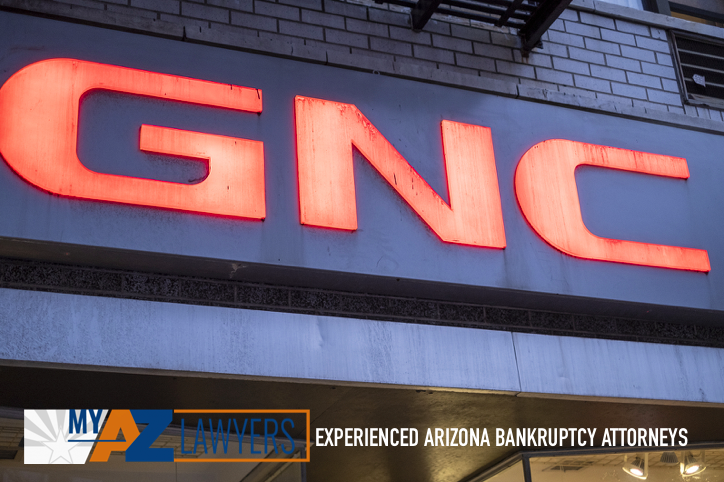
 As the coronavirus pandemic continues to wreak havoc on the global economy, more and more companies are filing for bankruptcy. This year has already seen retail giants like Neiman Marcus, JC Penney, J Crew, and True Religion file for Chapter 11 Bankruptcy. Huge fitness companies like Gold’s Gym and 24 Hour Fitness have also filed for bankruptcy protection amid the Coronavirus Pandemic. The latest big chain to file for Chapter 11 bankruptcy protection is GNC. The retail chain, which specializes in vitamins and dietary supplements, filed its bankruptcy petition June 23, 2020.
As the coronavirus pandemic continues to wreak havoc on the global economy, more and more companies are filing for bankruptcy. This year has already seen retail giants like Neiman Marcus, JC Penney, J Crew, and True Religion file for Chapter 11 Bankruptcy. Huge fitness companies like Gold’s Gym and 24 Hour Fitness have also filed for bankruptcy protection amid the Coronavirus Pandemic. The latest big chain to file for Chapter 11 bankruptcy protection is GNC. The retail chain, which specializes in vitamins and dietary supplements, filed its bankruptcy petition June 23, 2020. 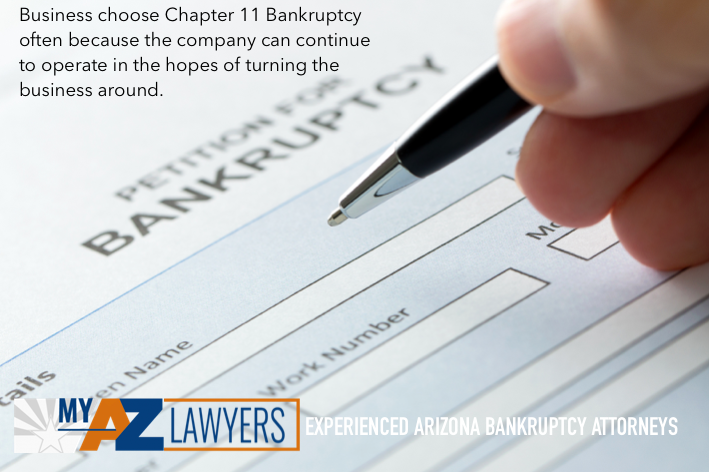 GNC intends to remain open during and after the
GNC intends to remain open during and after the 
 Most individual bankruptcies are filed under either Chapter 7 or Chapter 13. Chapter 7 bankruptcy has strict income limits and the filer will have to surrender any assets with more equity than that state’s exemptions. Most unsecured non-priority debts will be discharged in Chapter 7. Credit cards, medical bills, repossession deficiencies, and more will be liquidated without any repayment. However, there is a caveat: debts that were fraudulently incurred can’t be discharged in Chapter 7.
Most individual bankruptcies are filed under either Chapter 7 or Chapter 13. Chapter 7 bankruptcy has strict income limits and the filer will have to surrender any assets with more equity than that state’s exemptions. Most unsecured non-priority debts will be discharged in Chapter 7. Credit cards, medical bills, repossession deficiencies, and more will be liquidated without any repayment. However, there is a caveat: debts that were fraudulently incurred can’t be discharged in Chapter 7.  Gambling debts are typically accrued in a few different ways. If you took out personal loans or credit cards to pay for your gambling, these debts may be discharged in bankruptcy. They will be wiped clean in Chapter 7 bankruptcy, and are lower priority debts that may only be partially paid before discharge through Chapter 13 bankruptcy.
Gambling debts are typically accrued in a few different ways. If you took out personal loans or credit cards to pay for your gambling, these debts may be discharged in bankruptcy. They will be wiped clean in Chapter 7 bankruptcy, and are lower priority debts that may only be partially paid before discharge through Chapter 13 bankruptcy. 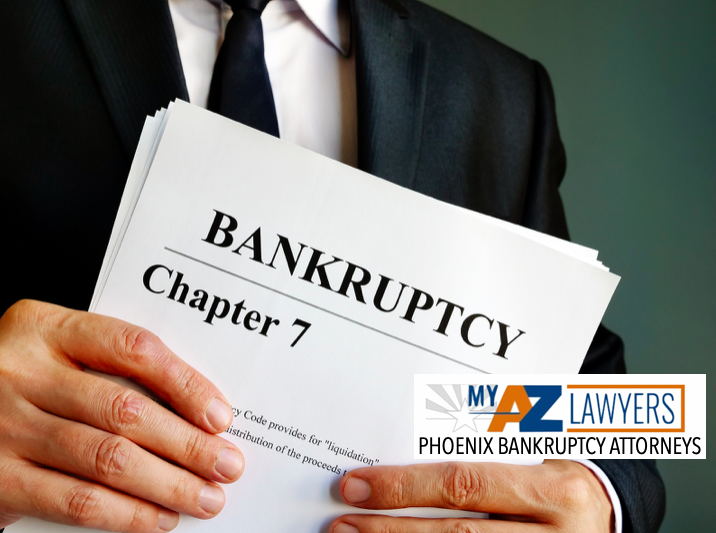
 Chapter seven bankruptcy is probably the most frequent kind of bankruptcy filed in the United States. Nevertheless, not everybody is permitted to obtain their debts discharged under Chapter seven of the U.S. Bankruptcy Code, so the following are a few simple demands for a situation. To understand whether you qualify for this particular case type, talk with a
Chapter seven bankruptcy is probably the most frequent kind of bankruptcy filed in the United States. Nevertheless, not everybody is permitted to obtain their debts discharged under Chapter seven of the U.S. Bankruptcy Code, so the following are a few simple demands for a situation. To understand whether you qualify for this particular case type, talk with a  Talk with a Chapter seven
Talk with a Chapter seven